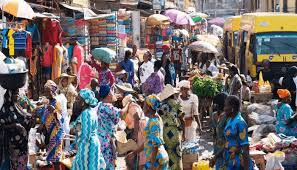
129 MILLION NIGERIANS TRAPPED IN POVERTY – WORLD BANK REPORT
The World Bank has released the Nigeria Development Update report, offering a bleak outlook on poverty in Nigeria, as it stated that over 129 million Nigerians now live below the national poverty line.
It released the report on Thursday in Abuja as Nigerians lamented the worsening hunger nationwide, and wondered when the country’s ballooning rate of inflation would slow down.
The global financial body’s report revealed that the over 129 million Nigerians who now live below the national poverty line represented a sharp rise from 40.1 per cent in 2018 to 56 per cent in 2024.
The World Bank report read, “With growth proving too slow to outpace inflation, poverty has risen sharply. Since 2018, the share of Nigerians living below the national poverty line is estimated to have risen sharply from 40.1 per cent to 56.0 per cent.
“Combined with population growth, this means that some 129 million Nigerians are living in poverty. This stark increase partly reflects Nigeria’s beleaguered growth record. Real GDP per capita has not recovered to the level it was at prior to the oil price-induced recession in 2016.
“The COVID-19 pandemic compounded this drop in economic activity. Moreover, growth is failing to outpace inflation: large increases in prices across almost all goods have diminished purchasing power.”
It added, “Multiple shocks in a context of high economic insecurity have deepened and broadened poverty, with over 115 million Nigerians estimated to have been poor in 2023. Since 2018/19, an additional nearly 35 million people have fallen into poverty, so that more than half of Nigerians (51.1 per cent of the population in 2023) are now estimated to live in poverty.”
It is observed that there was an increase from 115 million in 2023 to 129 million in 2024, which means that 14 million Nigerians have become poorer this year.
The Washington-based bank attributed this surge to inflation, poor economic management, and external shocks.
“Several shocks have contributed to this major increase and changing profile of the poor: the COVID-19 recession, natural disasters such as flooding, growing insecurity, the high cost of the demonetization policy in Q1 2023, high inflation, and low economic growth.
“Previous domestic policy missteps compounded the effects of the shocks, particularly rising inflation, eroding the purchasing power, especially of urban households, pushing many into poverty. The government is ramping up the cash transfer programs to support economically insecure households to help weather the crisis,” the report noted.
It further revealed that while poverty remained a rural phenomenon, urban poverty had grown significantly, with 31.3 per cent of urban dwellers now living in poverty, up from 18 per cent in 2018.
However, Governor Bala Mohammed of Bauchi State and the World Bank expressed opposing views on the effectiveness of President Bola Tinubu’s economic reforms at the launch of the Nigeria Development Update report in Abuja.
Mohammed criticised the policies, saying they failed to deliver the expected economic relief.
But the World Bank countered that the reforms, although painful, were crucial for Nigeria’s long-term stability and growth.
The Bauchi governor further highlighted the financial difficulties faced by state governments, stating that revenue allocations were insufficient to meet critical needs.
He said, “We should go back to the basics. Nigerians are not enjoying the regime at this time across board, not only the Federal Government, including the state and local governments. Therefore, the onus rests on you, the finance and the managers of the economy.
“We need to come up with a budget programme with economic policies that will reduce hardship. The money that we are sharing is not enough. The report spoke about employment, wages, and how many per cent of Nigerians are even employed. Most of our people live in the informal sector; we should look at how we can make them self-employed.
“The purchasing power has dwindled, these policies are not working and you know that.”
He complained that inflation was eroding the value of funds distributed through the Federation Account Allocation Committee, leaving state governments struggling.
“With all humility, please review your policies, they’re not working. Even the growing FAAC allocation is not enough because inflation is eating it up and the purchasing power of the people is dwindling, we are all living with these people and I can tell you we are at risk of being lynched because of your policies,” the Bauchi governor said.
On the issue of minimum wage, Mohammed disclosed that Bauchi State was still paying the previous wage of N33,000 but has set up a committee to consider the new wage implementation.
He pointed out that while some states can afford N70,000, Bauchi is prioritising sustainability.
“Some states can afford N70,000, some cannot. We in Bauchi State are paying the old minimum wage
 Premium News
Premium News